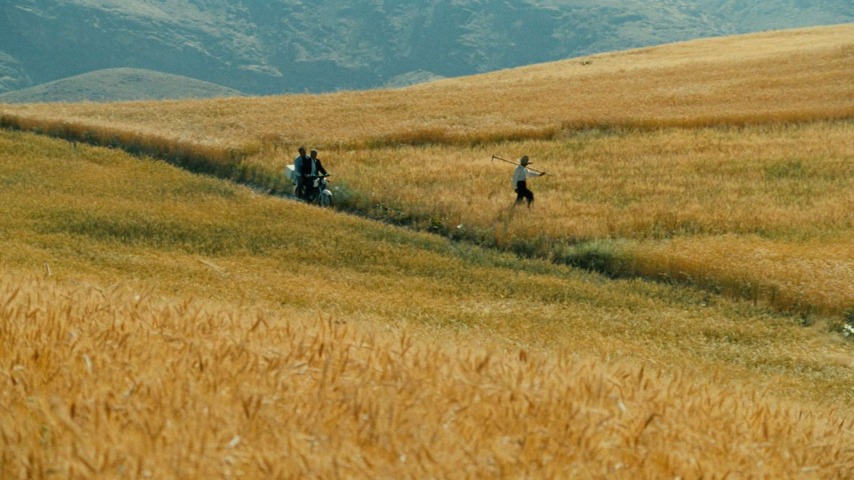Like many of Kiarostami’s movies, The Wind Will Carry Us reflexively comments on filmmaking, and on the writer-director’s own docu-fiction practices. The plot concerns a balding, bespectacled documentarian (Behzad Dorani, standing in for the balding and bespectacled Kiarostami) as he arrives in a Kurdish village built vertically into a mountainous corner of northwestern Iran. He’s there, on the sly, to shoot the funereal practices of these people. The problem is that the old woman that he’s been reassured is on the brink of death has been clinging stubbornly to life. It’s exploitative, built on a lie, and it’s poison in the veins of the real relationships he builds in town as his production fails to begin. The premise ties to Kiarostami’s Koker trilogy (Where Is The Friend’s House?; Life, and Nothing More…; and Through The Olive Trees), which saw the Tehran-born filmmaker shoot non-professionals navigating the winding pathways of the same small village, and feels inherently guilty. It’s no coincidence that Behzad Dorani’s hurried director is kind of a prick.
That’s why Kiarostami puts him through a pedestrian gauntlet—at times, literally. Like navigating the labyrinthine town itself (which involves ladders, zigzagging trails, and plenty of rooftop climbing), the filmmaker’s daily tasks go against the grain, his mounting frustrations helping him learn, the hard way, to let go. The pull of his profession’s demands are palpable, but increasingly distant. His crew members lounge entirely off-screen, bugging him about when they’ll finally give up on this morbid waiting game and go back home. His dying subject is never seen, though she’s often spoken of. His Tehran bosses call him on a rented cell phone, which only gets service at the top of a rocky hill housing the local cemetery. The repeated dusty drives back and forth to the high ground get increasingly funny, and increasingly obvious in their unimportance, as the film goes on.
What’s important, what’s tangible and visible in The Wind Will Carry Us, is the everyday life of this town and its people. From the young boy with whom the director forges a charming yet prickly friendship to the woman across the way whose ever-increasing brood of children becomes a wry punchline, these neighbors compose the majority of the film’s meaningful interactions. Some—like the milkmaid with whom the director flirts in the chiaroscuro darkness of a cellar, or the well-digger who’s nearly buried alive in a cave-in—are more reflections of the protagonist’s strengths and weaknesses. Others, like the doctor who takes the director through Impressionist fields of windswept grain on the back of his motorcycle, seem like guardian angels extending their wisdom to the misguided urbanite.
It’s to the credit of Kiarostami that this divide between the out-of-place filmmaker and the small-town locals never feels condescending. Dorani’s character never feels too smug, the villagers never seem too simple, and nobody possesses some secret enlightenment that comes from the quiet life. Their world is just a succession of little things—little tasks, little interactions, little conversations—into which not-so-little things—deaths, births, exams failed and passed—are carved, like a trail worn into a landscape over the course of generations. This isn’t unique; The Wind Will Carry Us softly reminds us that all our worlds are built from repetitions of familiar elements and shocks to the system. In this poetic universality, observed through the lens of a deceptive filmmaker, lies Abbas Kiarostami’s career-long struggle: To find reality in fiction and sincerity in artifice.

 Keep scrolling for more great stories.
Keep scrolling for more great stories.
